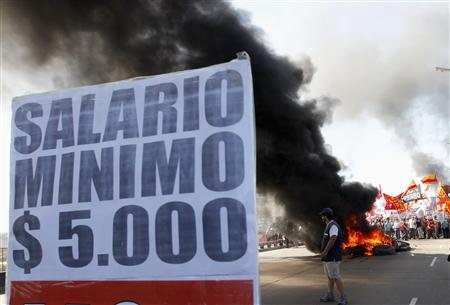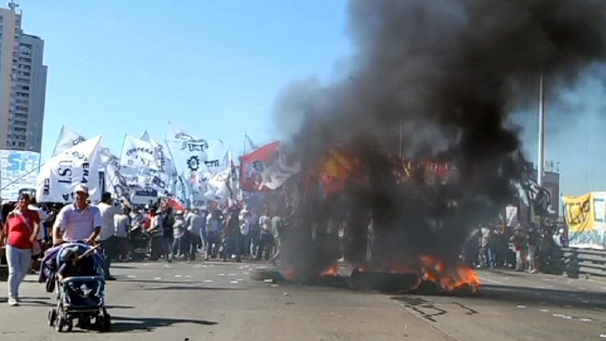Kirchner Faces General Strike in Argentina

Anti-government strikes by labor unions shut down much of Buenos Aires and other Argentine cities on Tuesday, closing public transport, roads and businesses, and grounding flights.
In the capital, most of the metro lines and trains were suspended, while unionists picketed the main roads in and out of the city so there was little traffic. Flights were canceled, and many banks and schools closed their doors, as the Associated Press reported.
The shut-down marked the first general strike in Argentina for a decade. It was called by two main unions, the General Labor Confederation (CGT) and the Argentine Workers Association (CTA), with support from the Argentine Agrarian Federation, bringing together bus drivers, train conductors and workers at ports, banks and airlines, reports Reuters. The unions are demanding pay rises and lower income taxes for workers, who have been hit hard by inflation.
One of the most prominent union leaders behind the strike is Hugo Moyano, a one-time ally of the Kirchners who is now a fierce opponent of President Cristina Kirchner, and is described by Reuters as “gruff former truck driver.” As well as his economic demands, Moyano has also criticized Kirchner’s authoritarian attitudes, telling press that her team “can’t manage the country in the way that it does, without providing answers, with authoritarian attitudes, imposing everything and defying all the world,” reports the AP. He comes from a different branch of Kirchner’s Peronist Party: “While Mr. Moyano represents Peronism’s traditional union roots, Mrs. Kirchner is firmly aligned with the party’s left,” according to the Wall Street Journal.

Kirchner’s approval ratings have plummeted to 32 percent since her re-election in October last year, amid concerns about rising crime and a faltering economy. The government claims inflation stands at 10 percent, though independent economists say it might have reached 27 percent. The economy is likely to grow by less than 3 percent this year, after averaging over 7 percent a year since 2003, reports the WSJ. Unemployment stands at 7.6 percent
The president won re-election promising wage hikes, and wages have gone up by an average 25 percent this year, but this has brought many more workers into a bracket where they must pay income tax, causing discontent.
The general strike follows protests by some 2 million people on November 8, many of them members of the middle classes who are angry over Kirchner’s leadership.
The union bosses hailed the action as a success. CTA head Pablo Micheli said “Thousands joined us to protest a government that doesn’t want to listen to us,” as the Buenos Aires Herald reports.
Kirchner responded with defiance, telling a crowd at a Sovereignty Day event, “No one is going to pressure me, especially with threats, bullying or thugs,” reports MercoPress, while her ministers described the strike as “extortion.”
Meanwhile, Kirchner’s office has revealed details of her salary in response to controversy over an alleged pay hike — she grossed some $13,600 this month, compared to $10,000 in January, reports EFE.
This news brief was originally published by Research Fellow Hannah Stone in the Pan-American Post and is used here with their permission.
See Other Articles on Argentina by Research Associate Gabriela Garton:

